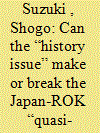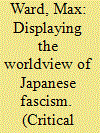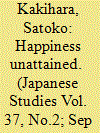|
|
|
Sort Order |
|
|
|
Items / Page
|
|
|
|
|
|
|
| Srl | Item |
| 1 |
ID:
139073


|
|
|
|
|
| Summary/Abstract |
Japan and the Republic of Korea (ROK) are said to have been in a “quasialliance” since the Cold War period, drawing closer at times during doubts over U.S. security commitment to Asia. In recent years, however, this status quo appears to have changed. Despite anxieties of U.S. retrenchment, the relations between the two states have hit an all-time low because of arguments over how the history of Japanese imperialism should be remembered, and they show no signs of improving. Does this mean that the quasi-alliance has ended? This article
examines this question, and concludes that the quasi-alliance between Japan and South Korea has broken down because of escalating arguments over the “history issue.” Japan-ROK bilateral relations are dogged by misunderstandings of each other, and that this is needlessly distancing the two states from one another. The termination of the Japan-ROK quasi-alliance because of the “history issue” is, on balance, a negative development for the security of the Asia-Pacific and a demonstration of short-term political judgement. If the two states are serious
about resolving this deadlock, both need to overcome mutual stereotypes that are
“taken for granted.”
|
|
|
|
|
|
|
|
|
|
|
|
|
|
|
|
| 2 |
ID:
140254


|
|
|
|
|
| Summary/Abstract |
This essay explores an imperial state exhibition held in Tokyo in 1938 and explains how the exhibition displayed a fascist worldview of historical crisis and national regeneration that was taking shape in Japan in the late 1930s. The exhibition – entitled the Thought War Exhibition (Shisōsen tenrankai) – was curated by the Japanese state's newly formed Cabinet Information Division (Naikaku jōhōbu) and held in Takashimaya Department Store in downtown Tokyo. Comprised of materials related to the Communist International, the Spanish Civil War, the national liberation struggle in China, and the communist and anticolonial movements inside the Japanese Empire, the Exhibition portrayed Japan's invasion of the Chinese mainland in 1937 as an extension of a global thought war against communism, requiring all imperial subjects to purify themselves of foreign influences and mobilize for national thought defense. While on the surface this Exhibition was an example of prewar state propaganda, it also expressed a fascist worldview that was coalescing in the Japanese state in the late 1930s. This essay investigates how this fascist worldview was exhibited in a sequence of displays, including dioramas, panoramas, illuminated maps, and display cases, and how these displays revealed constitutive contradictions that underwrote the formation of fascism in Japan.
|
|
|
|
|
|
|
|
|
|
|
|
|
|
|
|
| 3 |
ID:
155311


|
|
|
|
|
| Summary/Abstract |
Much scholarship on gender ideologies under Japanese imperialism remains demarcated by temporal and spatial lines. This article instead conceives the Japanese empire as a continuum, examining writings by women who published in and outside of East Asia, during the imperialist period and after decolonization. Specifically, it examines the femininities constructed in works by Japanese writer Ōsako Rinko (1915–2003) and Taiwanese writer Yang Qianhe (1921–2011), whose lives traversed geopolitical borders and ideological shifts from imperial modernization through decolonization. Showing how colonial modernity influenced gender constructions in different ways depending on the writers’ positionalities, this article illustrates how the writers negotiated happiness and spaces of belonging (whether geospatial locations in which to situate themselves, or daily practices and roles to perform) through their works. Furthermore, the article argues that freedom and happiness described by the two were consistently unattainable and postponed to a geopolitical temporality of dominance – the Japanese metropole, the United States, the imaginary West. The article thus examines gender and power among East Asian nations and the United States throughout the twentieth century.
|
|
|
|
|
|
|
|
|
|
|
|
|
|
|
|
|
|
|
|
|